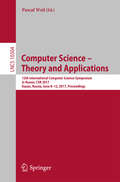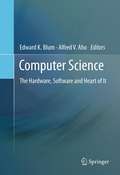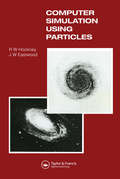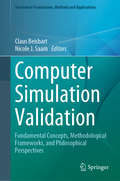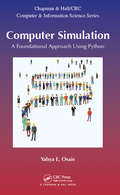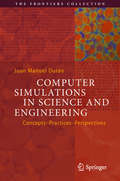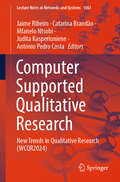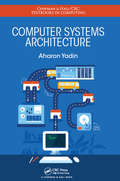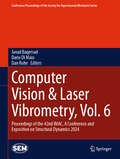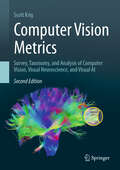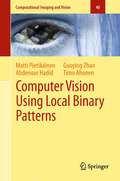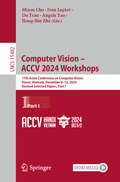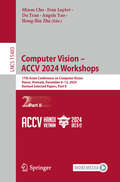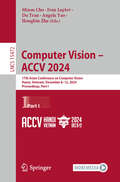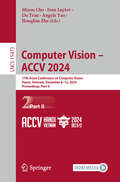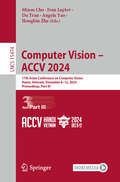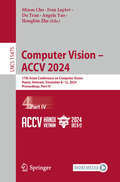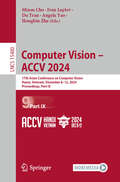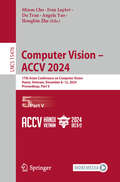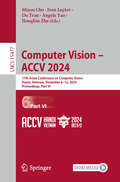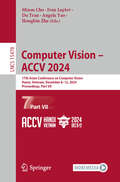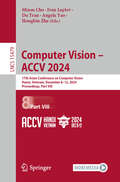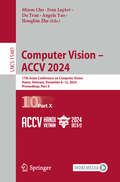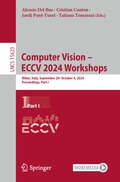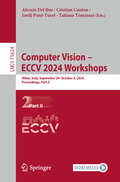- Table View
- List View
Computer Science – Theory and Applications: 12th International Computer Science Symposium in Russia, CSR 2017, Kazan, Russia, June 8-12, 2017, Proceedings (Lecture Notes in Computer Science #10304)
by Pascal WeilThis book constitutes the proceedings of the 12th International Computer Science Symposium in Russia, CSR 2017, held in Kazan, Russia, in June 2017. The 22 full papers presented in this volume were carefully reviewed and selected from 44 submissions. In addition the book contains 6 invited lectures. The scope of the proposed topics is quite broad and covers a wide range of areas such as: include, but are not limited to: algorithms and data structures; combinatorial optimization; constraint solving; computational complexity; cryptography; combinatorics in computer science; formal languages and automata; algorithms for concurrent and distributed systems, networks; applications of logic to computer science, e.g. proof theory, model checking and verification; formal and algorithmic aspects of bio-informatics; current challenges such as quantum computing.
Computer Science: The Hardware, Software and Heart of It (Principles Of Computer Science Ser.)
by Edward K. Blum Alfred V AhoComputer Science: The Hardware, Software and Heart of It focuses on the deeper aspects of the two recognized subdivisions of Computer Science, Software and Hardware. These subdivisions are shown to be closely interrelated as a result of the stored-program concept. Computer Science: The Hardware, Software and Heart of It includes certain classical theoretical computer science topics such as Unsolvability (e.g. the halting problem) and Undecidability (e.g. Godel's incompleteness theorem) that treat problems that exist under the Church-Turing thesis of computation. These problem topics explain inherent limits lying at the heart of software, and in effect define boundaries beyond which computer science professionals cannot go beyond. Newer topics such as Cloud Computing are also covered in this book. After a survey of traditional programming languages (e.g. Fortran and C++), a new kind of computer Programming for parallel/distributed computing is presented using the message-passing paradigm which is at the heart of large clusters of computers. This leads to descriptions of current hardware platforms for large-scale computing, such as clusters of as many as one thousand which are the new generation of supercomputers. This also leads to a consideration of future quantum computers and a possible escape from the Church-Turing thesis to a new computation paradigm. Computer Science: The Hardware, Software and Heart of It is designed as a professional book for practitioners and researchers working in the related fields of Quantum Computing, Cloud Computing, Computer Networking, as well as non-scientist readers. Advanced-level and undergraduate students concentrating on computer science, engineering and mathematics will also find this book useful.
Computer Simulation Using Particles
by R.W Hockney J.W EastwoodComputer simulation of systems has become an important tool in scientific research and engineering design, including the simulation of systems through the motion of their constituent particles. Important examples of this are the motion of stars in galaxies, ions in hot gas plasmas, electrons in semiconductor devices, and atoms in solids and liquids. The behavior of the system is studied by programming into the computer a model of the system and then performing experiments with this model. New scientific insight is obtained by observing such computer experiments, often for controlled conditions that are not accessible in the laboratory. Computer Simulation using Particles deals with the simulation of systems by following the motion of their constituent particles. This book provides an introduction to simulation using particles based on the NGP, CIC, and P3M algorithms and the programming principles that assist with the preparations of large simulation programs based on the OLYMPUS methodology. It also includes case study examples in the fields of astrophysics, plasmas, semiconductors, and ionic solids as well as more detailed mathematical treatment of the models, such as their errors, dispersion, and optimization.This resource will help you understand how engineering design can be assisted by the ability to predict performance using the computer model before embarking on costly and time-consuming manufacture.
Computer Simulation Validation: Fundamental Concepts, Methodological Frameworks, and Philosophical Perspectives (Simulation Foundations, Methods and Applications)
by Claus Beisbart Nicole J. SaamThis unique volume introduces and discusses the methods of validating computer simulations in scientific research. The core concepts, strategies, and techniques of validation are explained by an international team of pre-eminent authorities, drawing on expertise from various fields ranging from engineering and the physical sciences to the social sciences and history. The work also offers new and original philosophical perspectives on the validation of simulations.Topics and features: introduces the fundamental concepts and principles related to the validation of computer simulations, and examines philosophical frameworks for thinking about validation; provides an overview of the various strategies and techniques available for validating simulations, as well as the preparatory steps that have to be taken prior to validation; describes commonly used reference points and mathematical frameworks applicable to simulation validation; reviews the legal prescriptions, and the administrative and procedural activities related to simulation validation; presents examples of best practice that demonstrate how methods of validation are applied in various disciplines and with different types of simulation models; covers important practical challenges faced by simulation scientists when applying validation methods and techniques; offers a selection of general philosophical reflections that explore the significance of validation from a broader perspective.This truly interdisciplinary handbook will appeal to a broad audience, from professional scientists spanning all natural and social sciences, to young scholars new to research with computer simulations. Philosophers of science, and methodologists seeking to increase their understanding of simulation validation, will also find much to benefit from in the text.
Computer Simulation: A Foundational Approach Using Python (Chapman & Hall/CRC Computer and Information Science Series)
by Yahya Esmail OsaisComputer simulation is an effective and popular universal tool that can be applied to almost all disciplines. Requiring only basic knowledge of programming, mathematics, and probability theory, Computer Simulation: A Foundational Approach Using Python takes a hands-on approach to programming to introduce the fundamentals of computer simulation. The main target of the book is computer science and engineering students who are interested mainly in directly applying the techniques to their research problems. The book will be of great interest to senior undergraduate and starting graduate students in the fields of computer science and engineering and industrial engineering.
Computer Simulations in Science and Engineering: Concepts - Practices - Perspectives (The Frontiers Collection)
by Juan Manuel DuránThis book addresses key conceptual issues relating to the modern scientific and engineering use of computer simulations. It analyses a broad set of questions, from the nature of computer simulations to their epistemological power, including the many scientific, social and ethics implications of using computer simulations. The book is written in an easily accessible narrative, one that weaves together philosophical questions and scientific technicalities. It will thus appeal equally to all academic scientists, engineers, and researchers in industry interested in questions (and conceivable answers) related to the general practice of computer simulations.
Computer Supported Qualitative Research: New Trends in Qualitative Research (WCQR2024) (Lecture Notes in Networks and Systems #1061)
by António Pedro Costa Jaime Ribeiro Catarina Brandão Mfanelo Ntsobi Judita KasperiunieneThis book aims to bring together researchers, academics, and professionals, promoting the sharing and discussing knowledge, new perspectives, experiences, and innovations in Qualitative Research. This book includes selecting the articles accepted for presentation and discussion at WCQR2024, held January 23 to 25, 2024 (face-to-face and virtual conference). WCQR2024 featured four main application fields (Education, Health, Social Sciences, and Engineering/Technology) and seven main subjects: Rationale and Paradigms of Qualitative Research; Systematization of Approaches with Qualitative Studies; Qualitative and Mixed Methods Research; Data Analysis Types; Innovative Processes of Qualitative Data Analysis; Qualitative Research in Web Context; Qualitative Analysis with Software Support. The book is valuable for everyone interested in qualitative research, emphasizing Computer-Assisted Qualitative Data Analysis Software (CAQDAS).
Computer Systems Architecture (Chapman & Hall/CRC Textbooks in Computing)
by Aharon YadinComputer Systems Architecture provides IT professionals and students with the necessary understanding of computer hardware. It addresses the ongoing issues related to computer hardware and discusses the solutions supplied by the industry. The book describes trends in computing solutions that led to the current available infrastructures, tracing the initial need for computers to recent concepts such as the Internet of Things. It covers computers’ data representation, explains how computer architecture and its underlying meaning changed over the years, and examines the implementations and performance enhancements of the central processing unit (CPU). It then discusses the organization, hierarchy, and performance considerations of computer memory as applied by the operating system and illustrates how cache memory significantly improves performance. The author proceeds to explore the bus system, algorithms for ensuring data integrity, input and output (I/O) components, methods for performing I/O, various aspects relevant to software engineering, and nonvolatile storage devices, such as hard drives and technologies for enhancing performance and reliability. He also describes virtualization and cloud computing and the emergence of software-based systems’ architectures. Accessible to software engineers and developers as well as students in IT disciplines, this book enhances readers’ understanding of the hardware infrastructure used in software engineering projects. It enables readers to better optimize system usage by focusing on the principles used in hardware systems design and the methods for enhancing performance.
Computer Vision & Laser Vibrometry, Vol. 6: Proceedings of the 42nd IMAC, A Conference and Exposition on Structural Dynamics 2024 (Conference Proceedings of the Society for Experimental Mechanics Series)
by Dario Di Maio Javad Baqersad Dan RoheComputer Vision & Laser Vibrometry, Volume 6: Proceedings of the 42nd IMAC, A Conference and Exposition on Structural Dynamics, 2024, the sixth volume of ten from the Conference brings together contributions to this important area of research and engineering. The collection presents early findings and case studies on fundamental and applied aspects of Computer Vision, Laser Vibrometry and Structural Health Monitoring, including papers on: Novel Techniques Optical Methods, Scanning LDV Methods Photogrammetry & DIC Structural Health Monitoring
Computer Vision Metrics: Survey, Taxonomy, and Analysis of Computer Vision, Visual Neuroscience, and Visual AI
by Scott KrigThis 2nd Edition, based on the successful 2016 textbook, has been updated and expanded to cover 3rd generation Computer Vision and AI as it supersedes historical visual computing methods, providing a comprehensive survey of essential topics and methods in Computer Vision. With over 1,200 essential references, as well as chapter-by-chapter learning assignments, the book offers a valuable resource for students, researchers, scientists and engineers, helping them dig deeper into core computer vision and foundational visual computing and neuroscience topics. As before, a historical survey of advances in Computer Vision is provided, updated to reflect the latest methods such as Vision Transformers, attention models, alternative features such as Fourier neurons and Binary neurons, hybrid DNN architectures, self-supervised and enhanced learning models, Associative Multimodal Learning, Continuous Learning, View Synthesis, intelligent Scientific Imaging, andadvances in training protocols. Updates have also been added for 2d/3d cameras, software libraries and open source resources, computer vision cloud services, and vision/AI hardware accelerators. Discussion and analysis are provided to uncover intuition and delve into the essence of key advancements, applied and forward-looking topics.
Computer Vision Using Local Binary Patterns: Computer Vision Using Local Binary Patterns (Computational Imaging and Vision #40)
by Guoying Zhao Matti Pietikäinen Timo Ahonen Abdenour HadidThe recent emergence of Local Binary Patterns (LBP) has led to significant progress in applying texture methods to various computer vision problems and applications. The focus of this research has broadened from 2D textures to 3D textures and spatiotemporal (dynamic) textures. Also, where texture was once utilized for applications such as remote sensing, industrial inspection and biomedical image analysis, the introduction of LBP-based approaches have provided outstanding results in problems relating to face and activity analysis, with future scope for face and facial expression recognition, biometrics, visual surveillance and video analysis. Computer Vision Using Local Binary Patterns provides a detailed description of the LBP methods and their variants both in spatial and spatiotemporal domains. This comprehensive reference also provides an excellent overview as to how texture methods can be utilized for solving different kinds of computer vision and image analysis problems. Source codes of the basic LBP algorithms, demonstrations, some databases and a comprehensive LBP bibliography can be found from an accompanying web site. Topics include: local binary patterns and their variants in spatial and spatiotemporal domains, texture classification and segmentation, description of interest regions, applications in image retrieval and 3D recognition - Recognition and segmentation of dynamic textures, background subtraction, recognition of actions, face analysis using still images and image sequences, visual speech recognition and LBP in various applications. Written by pioneers of LBP, this book is an essential resource for researchers, professional engineers and graduate students in computer vision, image analysis and pattern recognition. The book will also be of interest to all those who work with specific applications of machine vision.
Computer Vision – ACCV 2024 Workshops: 17th Asian Conference on Computer Vision, Hanoi, Vietnam, December 8–12, 2024, Revised Selected Papers, Part I (Lecture Notes in Computer Science #15482)
by Angela Yao Minsu Cho Ivan Laptev Du Tran Hong-Bin ZhaThis 2-volume LNCS conference set constitutes the proceedings of the 17th Asian Conference on Computer Vision, in Hanoi, Vietnam, held during December 8–12, 2024. The 269 full papers included in this volume were carefully reviewed and selected from 839 submissions. The conference presents and discusses new problems, solutions, and technologies in computer vision, machine learning, and related areas in artificial intelligence.
Computer Vision – ACCV 2024 Workshops: 17th Asian Conference on Computer Vision, Hanoi, Vietnam, December 8–12, 2024, Revised Selected Papers, Part II (Lecture Notes in Computer Science #15483)
by Angela Yao Minsu Cho Ivan Laptev Du Tran Hong-Bin ZhaThis 2-volume LNCS conference set constitutes the proceedings of the 17th Asian Conference on Computer Vision, in Hanoi, Vietnam, held during December 8–12, 2024. The 269 full papers included in this volume were carefully reviewed and selected from 839 submissions. The conference presents and discusses new problems, solutions, and technologies in computer vision, machine learning, and related areas in artificial intelligence.
Computer Vision – ACCV 2024: 17th Asian Conference on Computer Vision, Hanoi, Vietnam, December 8–12, 2024, Proceedings, Part I (Lecture Notes in Computer Science #15472)
by Hongbin Zha Angela Yao Minsu Cho Ivan Laptev Du TranThis 10-volume LNCS conference set constitutes the proceedings of the 17th Asian Conference on Computer Vision, in Hanoi, Vietnam, held during December 8–12, 2024. The 270 full papers together included in this volume were carefully reviewed and selected from 839 submissions. The conference presents and discusses new problems, solutions, and technologies in computer vision, machine learning, and related areas in artificial intelligence.
Computer Vision – ACCV 2024: 17th Asian Conference on Computer Vision, Hanoi, Vietnam, December 8–12, 2024, Proceedings, Part II (Lecture Notes in Computer Science #15473)
by Hongbin Zha Angela Yao Minsu Cho Ivan Laptev Du TranThis 10-volume LNCS conference set constitutes the proceedings of the 17th Asian Conference on Computer Vision, in Hanoi, Vietnam, held during December 8–12, 2024. The 270 full papers together included in this volume were carefully reviewed and selected from 839 submissions. The conference presents and discusses new problems, solutions, and technologies in computer vision, machine learning, and related areas in artificial intelligence.
Computer Vision – ACCV 2024: 17th Asian Conference on Computer Vision, Hanoi, Vietnam, December 8–12, 2024, Proceedings, Part III (Lecture Notes in Computer Science #15474)
by Hongbin Zha Angela Yao Minsu Cho Ivan Laptev Du TranThis 10-volume LNCS conference set constitutes the proceedings of the 17th Asian Conference on Computer Vision, in Hanoi, Vietnam, held during December 8–12, 2024. The 270 full papers together included in this volume were carefully reviewed and selected from 839 submissions. The conference presents and discusses new problems, solutions, and technologies in computer vision, machine learning, and related areas in artificial intelligence.
Computer Vision – ACCV 2024: 17th Asian Conference on Computer Vision, Hanoi, Vietnam, December 8–12, 2024, Proceedings, Part IV (Lecture Notes in Computer Science #15475)
by Hongbin Zha Angela Yao Minsu Cho Ivan Laptev Du TranThis 10-volume LNCS conference set constitutes the proceedings of the 17th Asian Conference on Computer Vision, in Hanoi, Vietnam, held during December 8–12, 2024. The 270 full papers together included in this volume were carefully reviewed and selected from 839 submissions. The conference presents and discusses new problems, solutions, and technologies in computer vision, machine learning, and related areas in artificial intelligence.
Computer Vision – ACCV 2024: 17th Asian Conference on Computer Vision, Hanoi, Vietnam, December 8–12, 2024, Proceedings, Part IX (Lecture Notes in Computer Science #15480)
by Hongbin Zha Angela Yao Minsu Cho Ivan Laptev Du TranThis 10-volume LNCS conference set constitutes the proceedings of the 17th Asian Conference on Computer Vision, in Hanoi, Vietnam, held during December 8–12, 2024. The 270 full papers together included in this volume were carefully reviewed and selected from 839 submissions. The conference presents and discusses new problems, solutions, and technologies in computer vision, machine learning, and related areas in artificial intelligence.
Computer Vision – ACCV 2024: 17th Asian Conference on Computer Vision, Hanoi, Vietnam, December 8–12, 2024, Proceedings, Part V (Lecture Notes in Computer Science #15476)
by Hongbin Zha Angela Yao Minsu Cho Ivan Laptev Du TranThis 10-volume LNCS conference set constitutes the proceedings of the 17th Asian Conference on Computer Vision, in Hanoi, Vietnam, held during December 8–12, 2024. The 270 full papers together included in this volume were carefully reviewed and selected from 839 submissions. The conference presents and discusses new problems, solutions, and technologies in computer vision, machine learning, and related areas in artificial intelligence.
Computer Vision – ACCV 2024: 17th Asian Conference on Computer Vision, Hanoi, Vietnam, December 8–12, 2024, Proceedings, Part VI (Lecture Notes in Computer Science #15477)
by Hongbin Zha Angela Yao Minsu Cho Ivan Laptev Du TranThis 10-volume LNCS conference set constitutes the proceedings of the 17th Asian Conference on Computer Vision, in Hanoi, Vietnam, held during December 8–12, 2024. The 270 full papers together included in this volume were carefully reviewed and selected from 839 submissions. The conference presents and discusses new problems, solutions, and technologies in computer vision, machine learning, and related areas in artificial intelligence.
Computer Vision – ACCV 2024: 17th Asian Conference on Computer Vision, Hanoi, Vietnam, December 8–12, 2024, Proceedings, Part VII (Lecture Notes in Computer Science #15478)
by Hongbin Zha Angela Yao Minsu Cho Ivan Laptev Du TranThis 10-volume LNCS conference set constitutes the proceedings of the 17th Asian Conference on Computer Vision, in Hanoi, Vietnam, held during December 8–12, 2024. The 270 full papers together included in this volume were carefully reviewed and selected from 839 submissions. The conference presents and discusses new problems, solutions, and technologies in computer vision, machine learning, and related areas in artificial intelligence.
Computer Vision – ACCV 2024: 17th Asian Conference on Computer Vision, Hanoi, Vietnam, December 8–12, 2024, Proceedings, Part VIII (Lecture Notes in Computer Science #15479)
by Hongbin Zha Angela Yao Minsu Cho Ivan Laptev Du TranThis 10-volume LNCS conference set constitutes the proceedings of the 17th Asian Conference on Computer Vision, in Hanoi, Vietnam, held during December 8–12, 2024. The 270 full papers together included in this volume were carefully reviewed and selected from 839 submissions. The conference presents and discusses new problems, solutions, and technologies in computer vision, machine learning, and related areas in artificial intelligence.
Computer Vision – ACCV 2024: 17th Asian Conference on Computer Vision, Hanoi, Vietnam, December 8–12, 2024, Proceedings, Part X (Lecture Notes in Computer Science #15481)
by Hongbin Zha Angela Yao Minsu Cho Ivan Laptev Du TranThis 10-volume LNCS conference set constitutes the proceedings of the 17th Asian Conference on Computer Vision, in Hanoi, Vietnam, held during December 8–12, 2024. The 270 full papers together included in this volume were carefully reviewed and selected from 839 submissions. The conference presents and discusses new problems, solutions, and technologies in computer vision, machine learning, and related areas in artificial intelligence.
Computer Vision – ECCV 2024 Workshops: Milan, Italy, September 29–October 4, 2024, Proceedings, Part I (Lecture Notes in Computer Science #15623)
by Tatiana Tommasi Alessio Del Bue Cristian Canton Jordi Pont-TusetThe multi-volume set LNCS 15623 until LNCS 15646 constitutes the proceedings of the workshops that were held in conjunction with the 18th European Conference on Computer Vision, ECCV 2024, which took place in Milan, Italy, during September 29–October 4, 2024. These LNCS volumes contain 574 accepted papers from 53 of the 73 workshops. The list of workshops and distribution of the workshop papers in the LNCS volumes can be found in the preface that is freely accessible online.
Computer Vision – ECCV 2024 Workshops: Milan, Italy, September 29–October 4, 2024, Proceedings, Part II (Lecture Notes in Computer Science #15624)
by Tatiana Tommasi Alessio Del Bue Cristian Canton Jordi Pont-TusetThe multi-volume set LNCS 15623 until LNCS 15646 constitutes the proceedings of the workshops that were held in conjunction with the 18th European Conference on Computer Vision, ECCV 2024, which took place in Milan, Italy, during September 29–October 4, 2024. These LNCS volumes contain 574 accepted papers from 53 of the 73 workshops. The list of workshops and distribution of the workshop papers in the LNCS volumes can be found in the preface that is freely accessible online.
